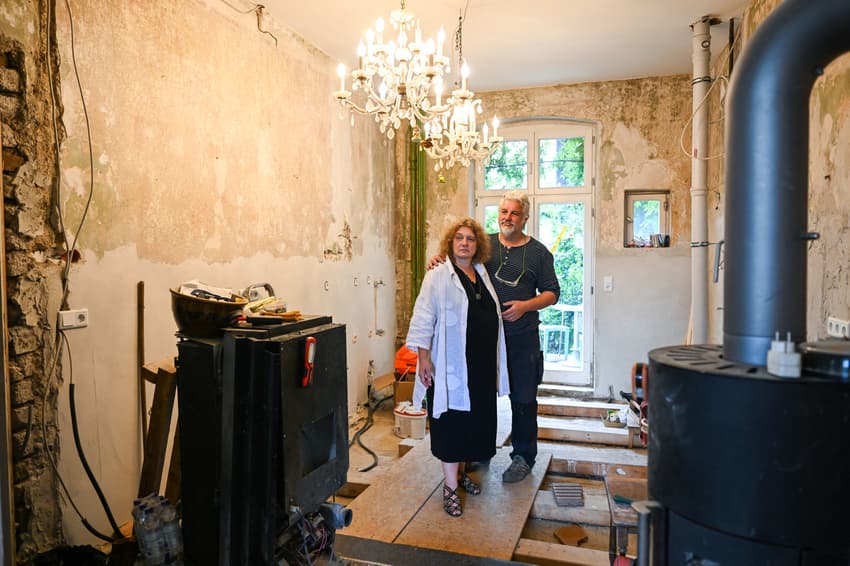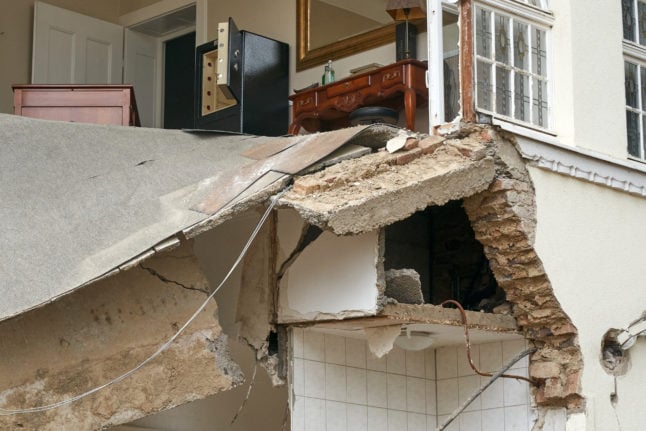German flood victims struggle to rebuild communities a year on

In Bad Neuenahr-Ahrweiler in western Germany, residents are still waiting for the return of normal life a year after the town was devastated by deadly flash floods - and many feel forgotten by authorities.
Around 18,000 inhabitants, or more than half the local population, were affected by the disaster in this once picturesque town in western Germany known for its thermal baths.
The anniversary of the night of July 14th, 2021 will be marked on Thursday with the visit of Chancellor Olaf Scholz.
The town mayor, Guido Orthen, will be able to show Scholz roads cleared of the muck and debris strewn by the flood waters that submerged the town.
But a return to the way things were "will still take time", he says, with the rebuild very much a work in progress.
READ ALSO: One year on - how life has changed for German flood survivors
"We still have temporary infrastructure, temporary playgrounds, temporary schools, temporary roads that make life possible," he says.
None of the 18 bridges that used to cross the Ahr river is functional yet, with three temporary crossings installed in their place.
'Disenchantment'
The traces of the flood are everywhere, from the collapsed banks by the roadside to the high-water mark on many of the buildings.
While officials may want to rebuild things as quickly as possible, they are also under pressure to make sure residents are protected from future floods.
As it stands, "we are still living in the same dangerous situation as a year ago", Orthen says, putting residents in a state of anxiety any time bad weather is forecast.
In Germany, 185 people were killed in the disaster. The majority of the fatalities were in the Ahr valley, which winds along 40 kilometres (25 miles) to where the river joins the Rhine to the south of Bonn.
Mayor Orthen is dismayed that protective measures to keep residents safe from future floods are subject to interminable bureaucratic discussions.
In zones with high flood risk, the houses that have been destroyed are not permitted to be rebuilt, while those that were damaged can be repaired.
Moreover, town officials face a mountain of paperwork, with Bad Neuenahr-Ahrweiler expected to submit 1,400 requests for reconstruction projects by the end of June 2023.

A ruined building in Bad Neuenahr-Ahrweiler after the floods in July 2021. Photo: picture alliance/dpa | Thomas Frey
"We won't be able to," Orthen says. Even with reinforcements, his staff is "exhausted".
After a year of living in a "state of emergency", the elected official sees "disenchantment" and a "feeling of powerlessness" growing among his residents.
Over 2,000 people have left Bad Neuenahr-Ahrweiler in the last year.
In the state of Rhineland-Palatinate, only €500 million in aid has been handed out of the total €15 billion set aside.
The slow progress is an "affront to those affected", according to conservative state legislator Horst Gies, quoted in the General Anzeiger daily.
In the neighbouring region of North Rhine-Westphalia, €1.6 billion of government support has been approved for use, out of a total of €12.3 billion.
'We want to exist'
In the town of Sinzig, around 15 kilometres from Ahrweiler, candles have been lit in front of a former care home for the mentally disabled, where 12 residents lost their lives in the floods.
The organisation that ran the establishment, Lebenshilfe, is still looking for a location to open a new facility.
IN PICTURES: The aftermath of Germany's catastrophic floods
"Our discussions with the mayor's office and the local administration still haven't produced anything," says Ulrich van Bebber from Lebenshilfe.
Frustration is building among those trying to rebuild their lives as promised help is slow to arrive.
"We want to exist in the eyes of Germany," says Iris Muenn-Buschow, the ground floor of her home still in the middle of repair works.
"We have the impression that everything else that goes on in the world is more important than what happens here in Germany," she says.
With her husband, she has founded an organisation called "the Ahr valley stands up" ("das Ahrtal steht auf") which has organised a series of protests.
"Nobody has forgotten the Ahr valley and the other regions," Rhineland-Palatinate state prime minister Malu Dreyer said recently, stressing the extent of the work still left to do.
By Jean-Philippe LACOUR
Comments
See Also
Around 18,000 inhabitants, or more than half the local population, were affected by the disaster in this once picturesque town in western Germany known for its thermal baths.
The anniversary of the night of July 14th, 2021 will be marked on Thursday with the visit of Chancellor Olaf Scholz.
The town mayor, Guido Orthen, will be able to show Scholz roads cleared of the muck and debris strewn by the flood waters that submerged the town.
But a return to the way things were "will still take time", he says, with the rebuild very much a work in progress.
READ ALSO: One year on - how life has changed for German flood survivors
"We still have temporary infrastructure, temporary playgrounds, temporary schools, temporary roads that make life possible," he says.
None of the 18 bridges that used to cross the Ahr river is functional yet, with three temporary crossings installed in their place.
'Disenchantment'
The traces of the flood are everywhere, from the collapsed banks by the roadside to the high-water mark on many of the buildings.
While officials may want to rebuild things as quickly as possible, they are also under pressure to make sure residents are protected from future floods.
As it stands, "we are still living in the same dangerous situation as a year ago", Orthen says, putting residents in a state of anxiety any time bad weather is forecast.
In Germany, 185 people were killed in the disaster. The majority of the fatalities were in the Ahr valley, which winds along 40 kilometres (25 miles) to where the river joins the Rhine to the south of Bonn.
Mayor Orthen is dismayed that protective measures to keep residents safe from future floods are subject to interminable bureaucratic discussions.
In zones with high flood risk, the houses that have been destroyed are not permitted to be rebuilt, while those that were damaged can be repaired.
Moreover, town officials face a mountain of paperwork, with Bad Neuenahr-Ahrweiler expected to submit 1,400 requests for reconstruction projects by the end of June 2023.

"We won't be able to," Orthen says. Even with reinforcements, his staff is "exhausted".
After a year of living in a "state of emergency", the elected official sees "disenchantment" and a "feeling of powerlessness" growing among his residents.
Over 2,000 people have left Bad Neuenahr-Ahrweiler in the last year.
In the state of Rhineland-Palatinate, only €500 million in aid has been handed out of the total €15 billion set aside.
The slow progress is an "affront to those affected", according to conservative state legislator Horst Gies, quoted in the General Anzeiger daily.
In the neighbouring region of North Rhine-Westphalia, €1.6 billion of government support has been approved for use, out of a total of €12.3 billion.
'We want to exist'
In the town of Sinzig, around 15 kilometres from Ahrweiler, candles have been lit in front of a former care home for the mentally disabled, where 12 residents lost their lives in the floods.
The organisation that ran the establishment, Lebenshilfe, is still looking for a location to open a new facility.
IN PICTURES: The aftermath of Germany's catastrophic floods
"Our discussions with the mayor's office and the local administration still haven't produced anything," says Ulrich van Bebber from Lebenshilfe.
Frustration is building among those trying to rebuild their lives as promised help is slow to arrive.
"We want to exist in the eyes of Germany," says Iris Muenn-Buschow, the ground floor of her home still in the middle of repair works.
"We have the impression that everything else that goes on in the world is more important than what happens here in Germany," she says.
With her husband, she has founded an organisation called "the Ahr valley stands up" ("das Ahrtal steht auf") which has organised a series of protests.
"Nobody has forgotten the Ahr valley and the other regions," Rhineland-Palatinate state prime minister Malu Dreyer said recently, stressing the extent of the work still left to do.
By Jean-Philippe LACOUR
Join the conversation in our comments section below. Share your own views and experience and if you have a question or suggestion for our journalists then email us at [email protected].
Please keep comments civil, constructive and on topic – and make sure to read our terms of use before getting involved.
Please log in here to leave a comment.